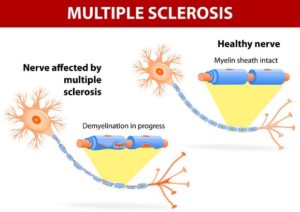Multiple Sclerosis (MS) is an inflammatory disease of the central nervous system (CNS) in which the nerve fibers in the brain and spinal cord are damaged, resulting in impaired signaling between the brain, spinal cord, and the rest of the body. A nerve fiber, or axon, is the part of a neuron (brain cell) that sends signals to other cells in the brain and body. The covering of an axon, known as the myelin sheath, becomes damaged through a process known as demyelination. This damage to the myelin sheath is thought to be inflicted by the immune system, for reasons that aren’t yet clear. As a result of demyelination, communication between neurons and the rest of the body becomes slowed or blocked, resulting in a range of symptoms. Approximately 400,000 people in the US have MS, with about 2.5 million worldwide.
is the part of a neuron (brain cell) that sends signals to other cells in the brain and body. The covering of an axon, known as the myelin sheath, becomes damaged through a process known as demyelination. This damage to the myelin sheath is thought to be inflicted by the immune system, for reasons that aren’t yet clear. As a result of demyelination, communication between neurons and the rest of the body becomes slowed or blocked, resulting in a range of symptoms. Approximately 400,000 people in the US have MS, with about 2.5 million worldwide.
What are the symptoms of Multiple Sclerosis (MS)?
There are many different symptoms associated with MS, since different nerve fibers can be affected by the disease. Often times, these symptoms can be quite subtle and confused with other health problems since they share similar complications. Additionally, for some people with MS, symptoms may be intermittent instead of constant. The onset of MS symptoms is typically seen in those between the ages of 20 and 40, but symptoms may begin as early as 10 years of age and as late as 80 years. Common symptoms of MS include:
- Tremors
- Weakness
- Physical imbalance, walking, and coordination issues
- Bowel and bladder problems
- Numbness
- Fatigue
- Poor eyesight
- Depression
Interested in learning more about Multiple Sclerosis research? Please call 561-296-3820. The Premiere Research Institute in West Palm Beach regularly conducts clinical research studies in the field of MS. To find out more about these studies click here or sign up for their newsletter to keep informed about the newest treatments, articles, and research that are being conducted in the field of MS.
